d5Hoare (PDF)
File information
This PDF 1.5 document has been generated by Adobe InDesign CS4 (6.0.3) / Adobe PDF Library 9.0, and has been sent on pdf-archive.com on 12/05/2013 at 03:47, from IP address 174.44.x.x.
The current document download page has been viewed 5440 times.
File size: 533.08 KB (12 pages).
Privacy: public file
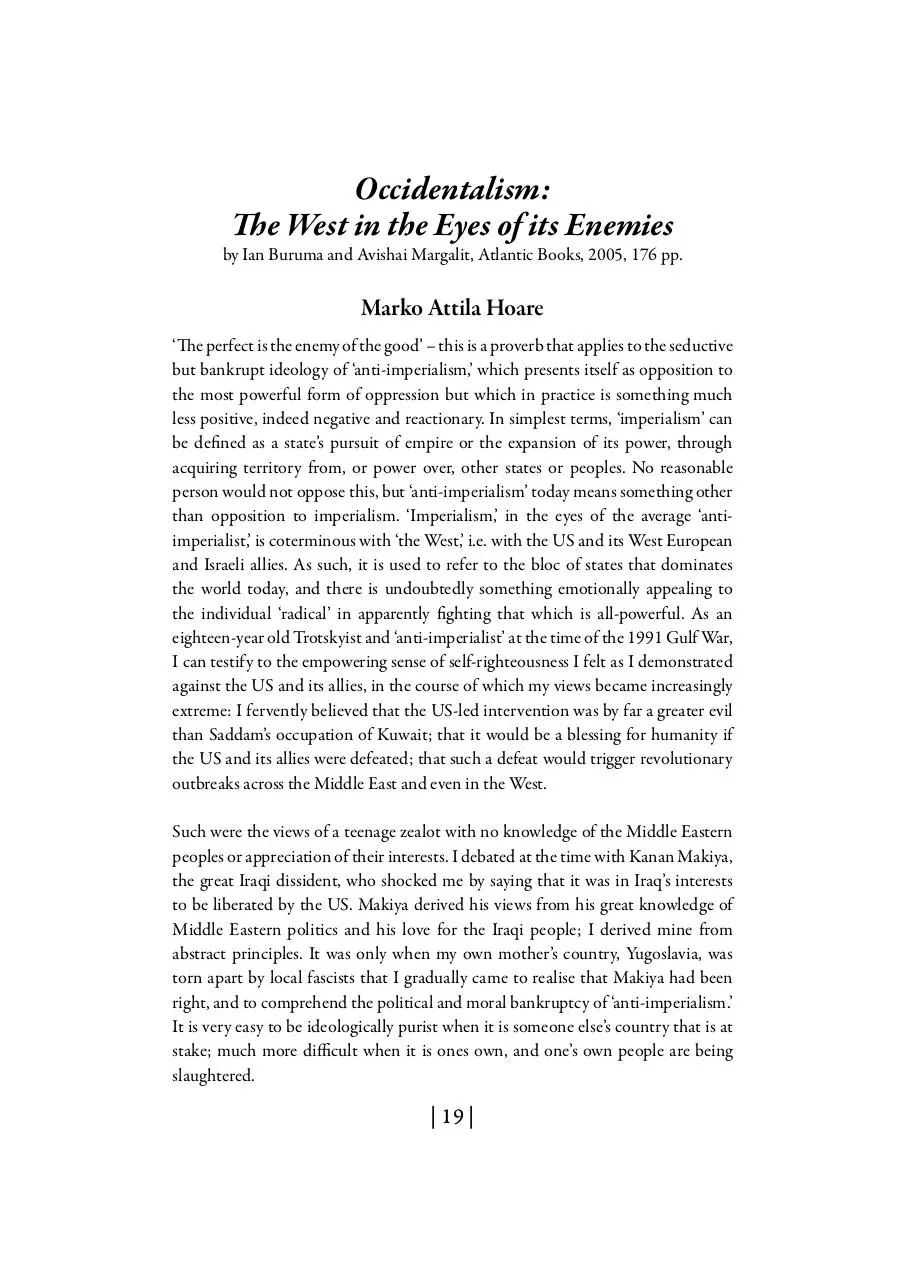
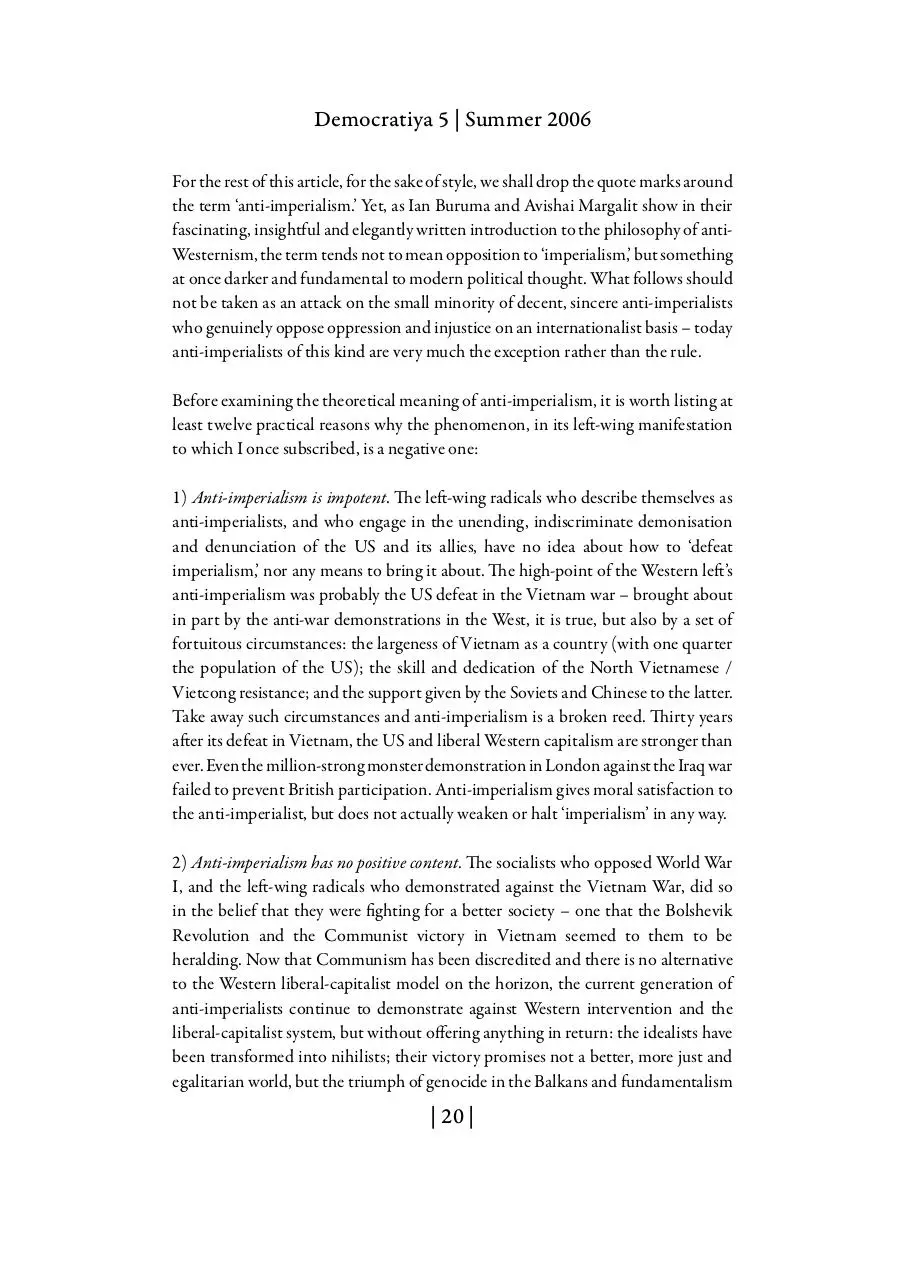
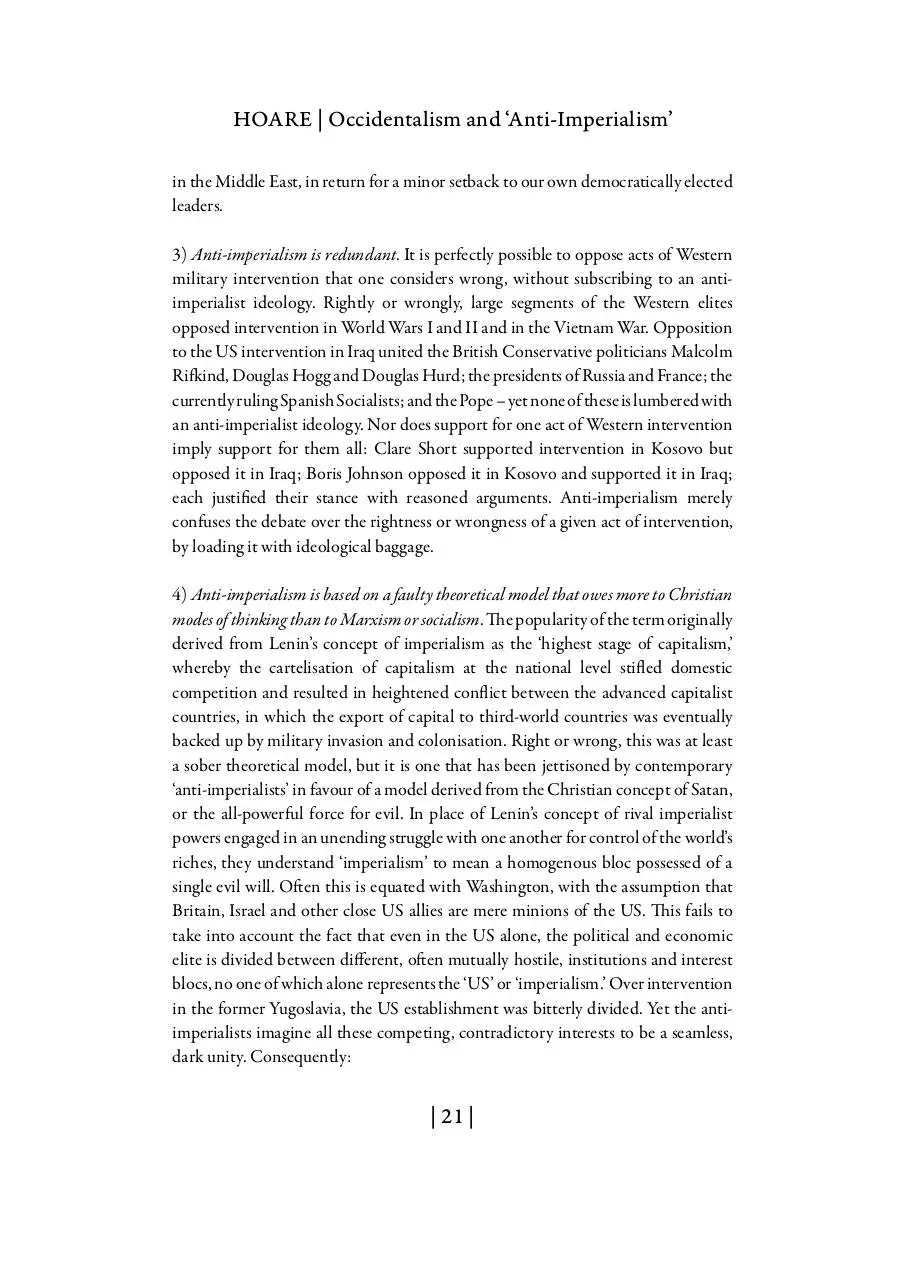
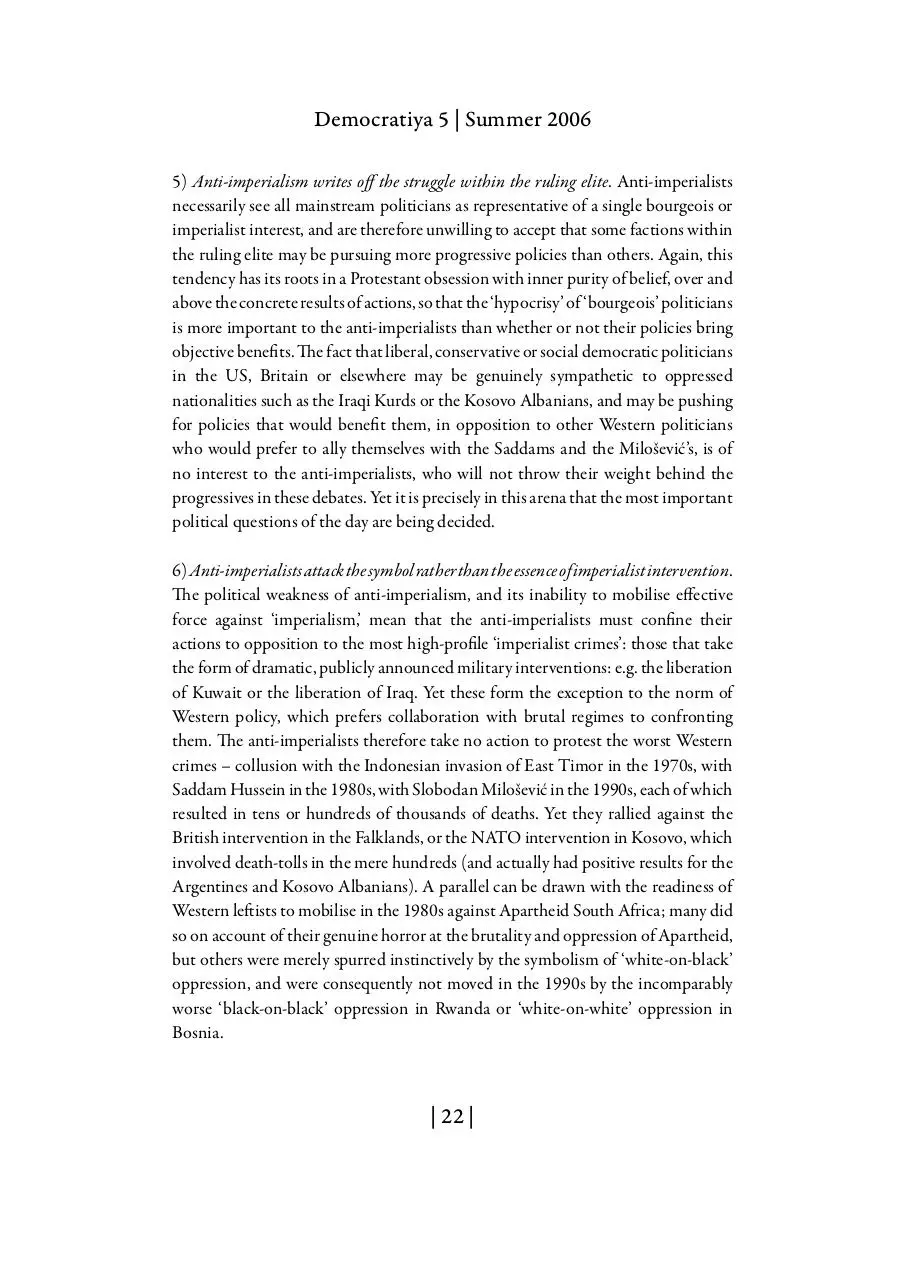
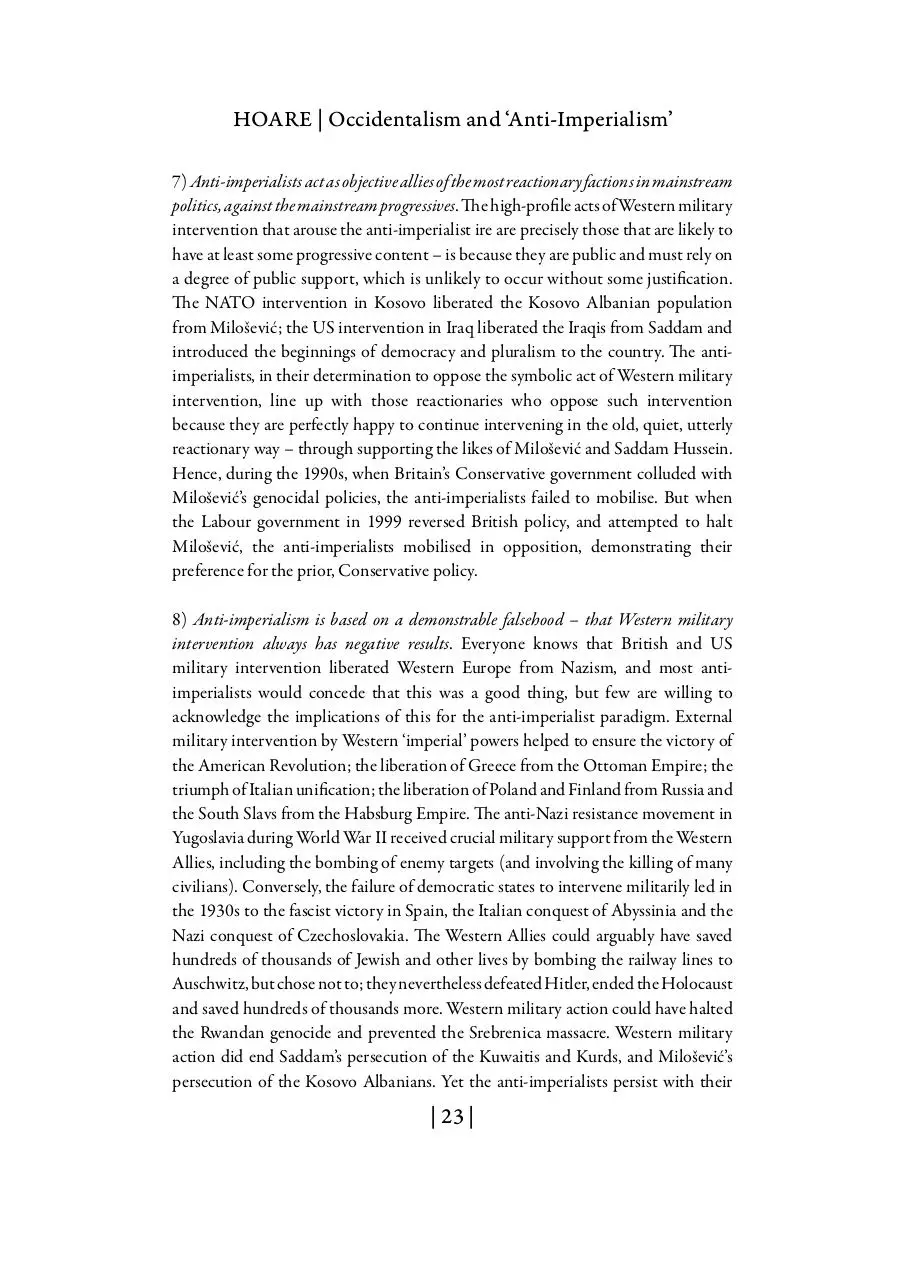
File preview
Occidentalism:
The West in the Eyes of its Enemies
by Ian Buruma and Avishai Margalit, Atlantic Books, 2005, 176 pp.
Marko Attila Hoare
‘The perfect is the enemy of the good’ – this is a proverb that applies to the seductive
but bankrupt ideology of ‘anti-imperialism,’ which presents itself as opposition to
the most powerful form of oppression but which in practice is something much
less positive, indeed negative and reactionary. In simplest terms, ‘imperialism’ can
be defined as a state’s pursuit of empire or the expansion of its power, through
acquiring territory from, or power over, other states or peoples. No reasonable
person would not oppose this, but ‘anti-imperialism’ today means something other
than opposition to imperialism. ‘Imperialism,’ in the eyes of the average ‘antiimperialist,’ is coterminous with ‘the West,’ i.e. with the US and its West European
and Israeli allies. As such, it is used to refer to the bloc of states that dominates
the world today, and there is undoubtedly something emotionally appealing to
the individual ‘radical’ in apparently fighting that which is all-powerful. As an
eighteen-year old Trotskyist and ‘anti-imperialist’ at the time of the 1991 Gulf War,
I can testify to the empowering sense of self-righteousness I felt as I demonstrated
against the US and its allies, in the course of which my views became increasingly
extreme: I fervently believed that the US-led intervention was by far a greater evil
than Saddam’s occupation of Kuwait; that it would be a blessing for humanity if
the US and its allies were defeated; that such a defeat would trigger revolutionary
outbreaks across the Middle East and even in the West.
Such were the views of a teenage zealot with no knowledge of the Middle Eastern
peoples or appreciation of their interests. I debated at the time with Kanan Makiya,
the great Iraqi dissident, who shocked me by saying that it was in Iraq’s interests
to be liberated by the US. Makiya derived his views from his great knowledge of
Middle Eastern politics and his love for the Iraqi people; I derived mine from
abstract principles. It was only when my own mother’s country, Yugoslavia, was
torn apart by local fascists that I gradually came to realise that Makiya had been
right, and to comprehend the political and moral bankruptcy of ‘anti-imperialism.’
It is very easy to be ideologically purist when it is someone else’s country that is at
stake; much more difficult when it is ones own, and one’s own people are being
slaughtered.
| 19 |
Democratiya 5 | Summer 2006
For the rest of this article, for the sake of style, we shall drop the quote marks around
the term ‘anti-imperialism.’ Yet, as Ian Buruma and Avishai Margalit show in their
fascinating, insightful and elegantly written introduction to the philosophy of antiWesternism, the term tends not to mean opposition to ‘imperialism,’ but something
at once darker and fundamental to modern political thought. What follows should
not be taken as an attack on the small minority of decent, sincere anti-imperialists
who genuinely oppose oppression and injustice on an internationalist basis – today
anti-imperialists of this kind are very much the exception rather than the rule.
Before examining the theoretical meaning of anti-imperialism, it is worth listing at
least twelve practical reasons why the phenomenon, in its left-wing manifestation
to which I once subscribed, is a negative one:
1) Anti-imperialism is impotent. The left-wing radicals who describe themselves as
anti-imperialists, and who engage in the unending, indiscriminate demonisation
and denunciation of the US and its allies, have no idea about how to ‘defeat
imperialism,’ nor any means to bring it about. The high-point of the Western left’s
anti-imperialism was probably the US defeat in the Vietnam war – brought about
in part by the anti-war demonstrations in the West, it is true, but also by a set of
fortuitous circumstances: the largeness of Vietnam as a country (with one quarter
the population of the US); the skill and dedication of the North Vietnamese /
Vietcong resistance; and the support given by the Soviets and Chinese to the latter.
Take away such circumstances and anti-imperialism is a broken reed. Thirty years
after its defeat in Vietnam, the US and liberal Western capitalism are stronger than
ever. Even the million-strong monster demonstration in London against the Iraq war
failed to prevent British participation. Anti-imperialism gives moral satisfaction to
the anti-imperialist, but does not actually weaken or halt ‘imperialism’ in any way.
2) Anti-imperialism has no positive content. The socialists who opposed World War
I, and the left-wing radicals who demonstrated against the Vietnam War, did so
in the belief that they were fighting for a better society – one that the Bolshevik
Revolution and the Communist victory in Vietnam seemed to them to be
heralding. Now that Communism has been discredited and there is no alternative
to the Western liberal-capitalist model on the horizon, the current generation of
anti-imperialists continue to demonstrate against Western intervention and the
liberal-capitalist system, but without offering anything in return: the idealists have
been transformed into nihilists; their victory promises not a better, more just and
egalitarian world, but the triumph of genocide in the Balkans and fundamentalism
| 20 |
Hoare | Occidentalism and ‘Anti-Imperialism’
in the Middle East, in return for a minor setback to our own democratically elected
leaders.
3) Anti-imperialism is redundant. It is perfectly possible to oppose acts of Western
military intervention that one considers wrong, without subscribing to an antiimperialist ideology. Rightly or wrongly, large segments of the Western elites
opposed intervention in World Wars I and II and in the Vietnam War. Opposition
to the US intervention in Iraq united the British Conservative politicians Malcolm
Rifkind, Douglas Hogg and Douglas Hurd; the presidents of Russia and France; the
currently ruling Spanish Socialists; and the Pope – yet none of these is lumbered with
an anti-imperialist ideology. Nor does support for one act of Western intervention
imply support for them all: Clare Short supported intervention in Kosovo but
opposed it in Iraq; Boris Johnson opposed it in Kosovo and supported it in Iraq;
each justified their stance with reasoned arguments. Anti-imperialism merely
confuses the debate over the rightness or wrongness of a given act of intervention,
by loading it with ideological baggage.
4) Anti-imperialism is based on a faulty theoretical model that owes more to Christian
modes of thinking than to Marxism or socialism. The popularity of the term originally
derived from Lenin’s concept of imperialism as the ‘highest stage of capitalism,’
whereby the cartelisation of capitalism at the national level stifled domestic
competition and resulted in heightened conflict between the advanced capitalist
countries, in which the export of capital to third-world countries was eventually
backed up by military invasion and colonisation. Right or wrong, this was at least
a sober theoretical model, but it is one that has been jettisoned by contemporary
‘anti-imperialists’ in favour of a model derived from the Christian concept of Satan,
or the all-powerful force for evil. In place of Lenin’s concept of rival imperialist
powers engaged in an unending struggle with one another for control of the world’s
riches, they understand ‘imperialism’ to mean a homogenous bloc possessed of a
single evil will. Often this is equated with Washington, with the assumption that
Britain, Israel and other close US allies are mere minions of the US. This fails to
take into account the fact that even in the US alone, the political and economic
elite is divided between different, often mutually hostile, institutions and interest
blocs, no one of which alone represents the ‘US’ or ‘imperialism.’ Over intervention
in the former Yugoslavia, the US establishment was bitterly divided. Yet the antiimperialists imagine all these competing, contradictory interests to be a seamless,
dark unity. Consequently:
| 21 |
Democratiya 5 | Summer 2006
5) Anti-imperialism writes off the struggle within the ruling elite. Anti-imperialists
necessarily see all mainstream politicians as representative of a single bourgeois or
imperialist interest, and are therefore unwilling to accept that some factions within
the ruling elite may be pursuing more progressive policies than others. Again, this
tendency has its roots in a Protestant obsession with inner purity of belief, over and
above the concrete results of actions, so that the ‘hypocrisy’ of ‘bourgeois’ politicians
is more important to the anti-imperialists than whether or not their policies bring
objective benefits. The fact that liberal, conservative or social democratic politicians
in the US, Britain or elsewhere may be genuinely sympathetic to oppressed
nationalities such as the Iraqi Kurds or the Kosovo Albanians, and may be pushing
for policies that would benefit them, in opposition to other Western politicians
who would prefer to ally themselves with the Saddams and the Milošević’s, is of
no interest to the anti-imperialists, who will not throw their weight behind the
progressives in these debates. Yet it is precisely in this arena that the most important
political questions of the day are being decided.
6) Anti-imperialists attack the symbol rather than the essence of imperialist intervention.
The political weakness of anti-imperialism, and its inability to mobilise effective
force against ‘imperialism,’ mean that the anti-imperialists must confine their
actions to opposition to the most high-profile ‘imperialist crimes’: those that take
the form of dramatic, publicly announced military interventions: e.g. the liberation
of Kuwait or the liberation of Iraq. Yet these form the exception to the norm of
Western policy, which prefers collaboration with brutal regimes to confronting
them. The anti-imperialists therefore take no action to protest the worst Western
crimes – collusion with the Indonesian invasion of East Timor in the 1970s, with
Saddam Hussein in the 1980s, with Slobodan Milošević in the 1990s, each of which
resulted in tens or hundreds of thousands of deaths. Yet they rallied against the
British intervention in the Falklands, or the NATO intervention in Kosovo, which
involved death-tolls in the mere hundreds (and actually had positive results for the
Argentines and Kosovo Albanians). A parallel can be drawn with the readiness of
Western leftists to mobilise in the 1980s against Apartheid South Africa; many did
so on account of their genuine horror at the brutality and oppression of Apartheid,
but others were merely spurred instinctively by the symbolism of ‘white-on-black’
oppression, and were consequently not moved in the 1990s by the incomparably
worse ‘black-on-black’ oppression in Rwanda or ‘white-on-white’ oppression in
Bosnia.
| 22 |
Hoare | Occidentalism and ‘Anti-Imperialism’
7) Anti-imperialists act as objective allies of the most reactionary factions in mainstream
politics, against the mainstream progressives. The high-profile acts of Western military
intervention that arouse the anti-imperialist ire are precisely those that are likely to
have at least some progressive content – is because they are public and must rely on
a degree of public support, which is unlikely to occur without some justification.
The NATO intervention in Kosovo liberated the Kosovo Albanian population
from Milošević; the US intervention in Iraq liberated the Iraqis from Saddam and
introduced the beginnings of democracy and pluralism to the country. The antiimperialists, in their determination to oppose the symbolic act of Western military
intervention, line up with those reactionaries who oppose such intervention
because they are perfectly happy to continue intervening in the old, quiet, utterly
reactionary way – through supporting the likes of Milošević and Saddam Hussein.
Hence, during the 1990s, when Britain’s Conservative government colluded with
Milošević’s genocidal policies, the anti-imperialists failed to mobilise. But when
the Labour government in 1999 reversed British policy, and attempted to halt
Milošević, the anti-imperialists mobilised in opposition, demonstrating their
preference for the prior, Conservative policy.
8) Anti-imperialism is based on a demonstrable falsehood – that Western military
intervention always has negative results. Everyone knows that British and US
military intervention liberated Western Europe from Nazism, and most antiimperialists would concede that this was a good thing, but few are willing to
acknowledge the implications of this for the anti-imperialist paradigm. External
military intervention by Western ‘imperial’ powers helped to ensure the victory of
the American Revolution; the liberation of Greece from the Ottoman Empire; the
triumph of Italian unification; the liberation of Poland and Finland from Russia and
the South Slavs from the Habsburg Empire. The anti-Nazi resistance movement in
Yugoslavia during World War II received crucial military support from the Western
Allies, including the bombing of enemy targets (and involving the killing of many
civilians). Conversely, the failure of democratic states to intervene militarily led in
the 1930s to the fascist victory in Spain, the Italian conquest of Abyssinia and the
Nazi conquest of Czechoslovakia. The Western Allies could arguably have saved
hundreds of thousands of Jewish and other lives by bombing the railway lines to
Auschwitz, but chose not to; they nevertheless defeated Hitler, ended the Holocaust
and saved hundreds of thousands more. Western military action could have halted
the Rwandan genocide and prevented the Srebrenica massacre. Western military
action did end Saddam’s persecution of the Kuwaitis and Kurds, and Milošević’s
persecution of the Kosovo Albanians. Yet the anti-imperialists persist with their
| 23 |
Democratiya 5 | Summer 2006
myth that Western military intervention must necessarily bring totally negative
results – not because it is true, but because their ideology depends upon it.
9) Anti-imperialism is anti-internationalist. By rejecting Western military
intervention, the anti-imperialists reject the only means by which Western
progressives can hope to halt genocide and fight oppression and tyranny abroad.
The more honourable and decent anti-imperialists have been ready to express
solidarity with the suffering people of Rwanda, Bosnia, Kosovo and Iraq. Yet such
expressions of solidarity do nothing to halt genocide or persecution. By rejecting
Western military intervention, the anti-imperialists confine themselves, at best,
to being passive spectators in foreign conflicts. More usually, however, they are
uninterested in such conflicts, unless and until the Western powers intervene in a
more high-profile manner – in which case the anti-imperialists invariably mobilise
to preserve the status quo and defend the fascists and persecutors from ‘Western
military intervention.’
10) Anti-imperialism is itself an expression of an imperialist mind-set. Antiimperialists are fundamentally uninterested in the rights or wrongs of a conflict in
a foreign country; their sole concern is their own geopolitical agenda. Thus, over
Yugoslavia, they tended to support Milošević’s Serbia on an ‘anti-imperialist’ basis,
sacrificing the rights of Milošević’s Croatian, Bosnian or Kosovar victims to the
‘higher’ anti-imperialist cause (in fact, the Western powers themselves aided and
abetted Milošević – but that’s another story). Likewise, the anti-imperialists would
be happy to consign Iraq to rule by Islamic fundamentalist mass-murderers – just
so that the US can suffer a defeat. This is called subordinating the interests of nonWestern peoples to Western political concerns, and is the direct counterpart of the
readiness of Western Cold Warriors to support every brutal right-wing dictator –
Somoza, Fahd, Marcos, Pinochet, Suharto – provided he was anti-Communist. For
the Western imperialists of the left and of the right, non-Western countries are mere
battlefields for the struggle against their own enemies – whether ‘imperialist’ or
Communist. Anti-imperialists differ from right-wing imperialists in their choice of
enemies, yet the two camps are mirror-images of each other, not opposites.
11) Anti-imperialism means allying with local oppressors against local democrats. In
the former Yugoslavia, Iraq and elsewhere, those most committed to democracy, human
rights, the rule of law and the rights of women and national minorities, invariably
tend to look to the West as a source of inspiration, in contrast with the fascists,
| 24 |
Hoare | Occidentalism and ‘Anti-Imperialism’
theocrats and ethnic-cleansers who mobilise on the basis of xenophobia, national
chauvinism and religious fundamentalism – and anti-Westernism. In painting
‘imperialism’ as the root of all evil, the anti-imperialists give grist to the mill of the
local oppressors – Iraqi Ba’athists, Serb Chetniks, Islamists and others – who blame
their countries’ ills on Western interference and demonise their liberal domestic
opponents as stooges of the West. By blaming the West for everything that goes
wrong in the Balkans, the Middle East and elsewhere, the anti-imperialists absolve
the local oppressors of responsibility for their crimes, and turn their backs on the
local progressives who try to oppose these crimes.
12) Anti-imperialism slips effortlessly into opposition to Western values. It is perfectly
possible to oppose the negative aspects of Western policy abroad – such as unfair
trade rules or the bombing of civilians – while upholding the values of Western
liberal democracy: parliamentary sovereignty, the rule of law, separation of powers,
multi-party elections, equality of the sexes, gay rights, free trade unions, etc. Yet
the anti-imperialists tend to see Western values themselves as a form of oppression.
They prefer the regimes of China, Belarus, Zimbabwe or Cuba to those in the West,
and oppose not merely the means by which the US seeks to introduce democracy
in Iraq, but the goal itself. They rage against the ‘colour-coded revolutions’ that
overthrew the neo-Communist regimes of Serbia, Georgia, Ukraine and Kyrgyzstan
– not because they genuinely fear these countries will be ‘enslaved by imperialism,’
but because they hate Western-style liberal democracy. The anti-imperialists object
little, if at all, to genuinely imperialist crimes by non-Western states: China’s
colonialism in Tibet; Argentina’s invasion of the Falklands; Iraq’s occupation of
Kuwait; Serbia’s wars in Croatia, Bosnia and Kosovo; Russia’s assault on Chechnya.
Ultimately, anti-imperialism is not really about opposing imperialism, but about
something else.
It is the last of these practical problems with anti-imperialism that indicates
its ideological and psychological origins. As Buruma and Margalit show in
Occidentalism: The West in the Eyes of its Enemies, anti-imperialist ideas can
form part of a larger phenomenon of ‘Occidentalism’: the ideology of violent
opposition to Western political and moral values; not just democracy and political
pluralism, but also individualism, the emancipation of women and sexual freedom.
The authors discuss a wide range of regional case-studies under the umbrella of
Occidentalism: Japanese nationalists; Russian Slavophiles; German Nazis; Korean
Communists; and, of course, Islamists. All these groups arose in opposition to a
perceived Western enemy; in one way or another, they all sought to understand the
| 25 |
Democratiya 5 | Summer 2006
reasons for Western success – both technological and organisational – and apply
them to resist the Westernisation of their own societies. The authors discuss a range
of historical phenomena that are in some ways related to Occidentalism, including
Romanticism, fascism, totalitarianism and Communism. They present the paradox
of Occidentalism: that the Occidentalist mind-set is itself forged through close
contact with Western ideas and culture, and that the Occidentalist can therefore
never entirely escape the West.
Buruma and Margalit discuss the Occidentalists’ hatred of the Western city, with
its relaxed social mores and sexually liberated women, which they find deeply
threatening. At the psychological level, therefore, Occidentalism is related to sexual
insecurity and fear of the body. Discussing the Egyptian Islamist Sayyid Qutb and
the stay in the US which shaped his subsequent ideology, the authors note: ‘In his
letters home, Qutb was particularly distressed by the ‘seductive atmosphere,’ the
shocking sensuality of daily life, and the immodest behaviour of American women’
(p. 32); ‘He found the spectacle of young women dancing to a current hit, “Baby,
It’s Cold Outside”, horrifying.’ (p. 118). This psychological dislike of the Western
lifestyle is linked to a political dislike, as the Western cultural system involving
individual choice, personal autonomy and the acceptance of difference and a degree
of selfishness makes individuals immune to the fundamentalist or totalitarian
temptation: ‘The Occident, as defined by its enemies, is seen as a threat not because
it offers an alternative system of values, let alone a different route to Utopia. It
is a threat because its promises of material comfort, individual freedom, and the
dignity of unexceptional lives deflate all utopian pretences.’ (p. 72) Occidentalism
therefore involves some political and psychological themes that are fundamental to
the human condition.
There is a certain tension, in Buruma’s and Margalit’s thesis, between the general
and the specific. On the one hand, they attribute Occidentalism to a range of
individuals and groups, from Marx, Dostoevsky, Nietzsche and T.S. Eliot through
Hitler, the kamikaze, Mao and Pol Pot to bin Laden and the Serb besiegers of
Sarajevo. This suggests that Occidentalism is a universally present and unavoidable
element in the modern world; a constant shadow to modernity. Yet, on the other
hand, the authors portray certain cultural milieus as having a particular affinity to
Occidentalism, among them the milieus of German nationalism before World War
II (unlike its British or French counterparts) and Russian Orthodox Christianity
(unlike its Protestant and Catholic counterparts). It is unclear from the authors’
| 26 |
Hoare | Occidentalism and ‘Anti-Imperialism’
account whether, for example, an Anglo-Saxon variety of Occidentalism is possible.
On the one hand, they point out that ‘Neither capitalism nor liberal democracy
ever pretended to be a heroic creed’ (p. 71); they contrast the Occidentalists’
thirst for heroism, self-sacrifice and martyrdom with the liberals’ acceptance of
the ordinariness of everyday life for the majority of people: ‘Liberals, in line with
a Puritan tradition, have learned to accept this. More than that, as witnessed by
seventeenth-century Dutch painting and English novels, they recognise that the
unexceptional, everyday life has dignity too and should be nurtured, not scorned.’
(p. 71). This suggests that the Anglo-Saxon and Dutch cultural traditions are
not conducive to Occidentalism; a viewpoint that may be valid, but that will
undoubtedly be challenged.
That Buruma and Margalit do not describe an Anglo-Saxon version of Occidentalism
may also be because they believe that for the political and intellectual classes in the
original ‘West’ – Britain, the US and the Netherlands – there was no Western ‘other’
against which to identify themselves (though English nationalists have traditionally
felt an explosive mixture of admiration and hatred for the enticing, overwhelming
and threatening culture of their French neighbours and enemies, feelings that may
resemble those of Occidentalists toward the West). If this is indeed what the authors
believe, then they are following the familiar path of theorists of nationalism, such
as Liah Greenfeld and Adrian Hastings, who view England as the prototypical
nation-state, on the model of which subsequent nation-states necessarily defined
themselves; only the first-comer could be free of the influence of prior examples. Be
that as it may, the question of whether Occidentalism is a universal phenomenon or
one that is specific to region and epoch is one that needs to be resolved.
Buruma’s and Margalit’s Occidentalism stands in the tradition of the elegant,
sweeping surveys of a broad topic, such as the classics Imagined Communities by
Benedict Anderson and Passages from Antiquity to Feudalism by Perry Anderson.
As such, it suffers from the dangers inherent in such surveys: of oversimplification,
and the squeezing of specific cases to fit the general theory. Thus, Buruma and
Margalit claim: ‘Before taking on Stalin’s Asiatic hordes, [Nazi] Germany went to
war with the West. This assault on the liberal democratic states, seen as artificial,
rationalistic, racially hybrid, materialist, and lousy with greedy Jews, was a pure
example of murderous Occidentalism in the heart of the European continent.’
(p. 35). This is a gross oversimplification – among other things, it was Britain and
France which declared war on Germany, not vice versa. The authors’ attribution
of Occidentalist tendencies to American neoconservative circles (p. 59) also fails
| 27 |
Democratiya 5 | Summer 2006
to convince; while the neoconservatives share with Occidentalists a dislike of softliberal flaccidity and compromise, a love of dynamism and a confrontational style,
they also believe precisely in the need to spread Western values throughout the
world; if this can be encompassed within Occidentalism, then the term has been
stretched to the point of meaninglessness. Buruma and Margalit are correct to point
out the Occidentalist implications of some of Marx’s ideas (pp. 102-3, 109-10) –
something that too many Marxists have avoided acknowledging. Yet Marx was also,
of course, a great champion of Westernisation and globalisation – a paradox that
requires acknowledgement.
Lest it appear from this that Buruma’s and Margalit’s work lacks nuance, mention
should be made of their most illuminating sub-categorisation: the division of
Occidentalism into the racial or national variety on the one hand and the religious
or political on the other. As they put it, ‘there is a difference between those who
fight for a specific nation or race and those who go to battle for religious or political
creeds: the former exclude outsiders; they believe they are the chosen ones. The
latter often makes claims for universal salvation.’ (p. 101). The division, they add,
is not clear cut, and they point out a fact often forgotten by opponents of the Iraq
war, who mention, endlessly, that Ba’athist Iraq was a secular state with nothing in
common with Al Qaeda: ‘the Ba’athists, when it suits them, have also encouraged
religious terrorism against the Western ‘Crusaders’ and ‘Zionists.’ Saddam Hussein,
for one, liked to portray himself as Saladin, saviour of the Arabs, riding his white
steed to wipe out the infidels.’ (p. 146). Nevertheless, the qualified division of
Occidentalism into two types is an important one. For the religious Occidentalists
– be they Muslim, Jewish or Christian – politics are seen in Manichean terms as a
conflict between the absolute good and the absolute evil, between which there is
no middle ground. The same could be said for left-wing anti-imperialists, whose
demonisation of the liberal-capitalist West has frequently led them to be blind
to the reactionary, criminal nature of Iraqi Ba’athists, Serb Chetniks, and Islamist
terrorists, not to mention the earlier crimes of the Soviet Union and Communist
China.
Buruma’s and Margalit’s work also indicates the thin line dividing anti-imperialism
from imperialism. The nationalist Occidentalists’ desire to liberate their respective
nations from Western domination, real or perceived, goes hand in hand with
imperialisms of their own. The syndicalist fathers of Italian Fascism saw Italy as a
‘proletarian nation’ denied its rightful place in the world by the established capitalist
| 28 |
Hoare | Occidentalism and ‘Anti-Imperialism’
powers of Britain and France, and advocated colonial expansion as a response.
Hitler sought to free Germany from what he perceived to be the domination of
international Jewish finance-capital; the quest for lebensraum was part of this goal.
And the Japanese nationalists of the 1940s adopted the name ‘Greater East Asia
Co-Prosperity Sphere’ as a fig-leaf behind which their empire could pose as the
embodiment of Asian freedom from European colonialism. Likewise, the MarxistLeninists who ran the Soviet Union were ideologically ‘anti-imperialist,’ but were
nevertheless guilty of some of the worst acts of imperialist aggression in human
history. More recently, Saddam’s occupation of Kuwait and Milošević’s assaults on
Croatia, Bosnia and the Kosovo Albanians were all acts of imperialist aggression,
but justified with an anti-imperialist rhetoric that sections of the Western left
accepted. The anti-imperialism of Occidentalists is ultimately not about opposing
imperialism, but about opposing ‘the West’; its political model and cultural values.
Buruma’s and Margalit’s Occidentalism is required reading for all those wishing to
understand why such anti-imperialism should be rejected.
Marko Attila Hoare is an Advisory Editor of Democratiya. Formerly a Research
Fellow in the Faculty of History, University of Cambridge, he is now a Senior
Research Fellow at Kingston University, London. He is the author of How Bosnia
Armed, a short history of the Bosnian Army, published by Saqi Books in 2004.
His second book, Genocide and Resistance in Hitler’s Bosnia: The Partisans and
the Chetniks, 1941-43, will be published later this year by the British Academy in
association with Oxford University Press.
| 29 |
a journal of politics and ideas
Download d5Hoare
d5Hoare.pdf (PDF, 533.08 KB)
Download PDF
Share this file on social networks
Link to this page
Permanent link
Use the permanent link to the download page to share your document on Facebook, Twitter, LinkedIn, or directly with a contact by e-Mail, Messenger, Whatsapp, Line..
Short link
Use the short link to share your document on Twitter or by text message (SMS)
HTML Code
Copy the following HTML code to share your document on a Website or Blog
QR Code to this page

This file has been shared publicly by a user of PDF Archive.
Document ID: 0000104336.